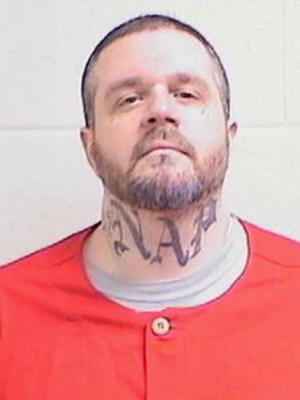Indiana man set for execution in state's second since 2009
[May 19, 2025]
By SOPHIA TAREEN and ED WHITE
MICHIGAN CITY, Ind. (AP) — An Indiana man convicted in the 2000 killing
of a police officer is set to receive a lethal injection early Tuesday
in the state’s second execution in 15 years.
Benjamin Ritchie, 45, has been on death row for more than 20 years after
being convicted in the fatal shooting of Beech Grove Police Officer Bill
Toney during a foot chase.
Unless there’s last-minute court action, Ritchie is scheduled to be
executed “before the hour of sunrise” at the Indiana State Prison in
Michigan City, according to state officials.
Indiana resumed executions in December after a yearslong hiatus due to
scarcity of lethal injection drugs nationwide. Prison officials provided
photos of the execution chamber in advance of Joseph Corcoran’s
execution, showing a space that looks like a sparse operating room with
a gurney, fluorescent lighting, a floor drain and an adjacent viewing
room. They have offered few other details about the process, including
the time the executions take place.
Among 27 states with death penalty laws, Indiana is one of two that bars
media witnesses. The other, Wyoming, has conducted one execution in the
last half-century. The Associated Press and other media organizations
have filed a federal lawsuit in Indiana seeking media access.
The execution Tuesday in Indiana is among 12 scheduled in eight states
this year. Ritchie's execution and two others in Texas and Tennessee
will be carried out this week.
The 2000 fatal shooting of a police officer
Ritchie was 20 when he and others stole a van in Beech Grove, near
Indianapolis. He then fired four shots at Toney during a foot chase,
killing him.
At the time Ritchie was on probation from a 1998 burglary conviction.

Toney, 31, had worked at the Beech Grove Police Department for two
years. He was the first officer of the police department of roughly 30
officers to be killed by gunfire in the line of duty. The community of
14,000 people mourned the married father of two as a neighborly person
who showed up to help others.
When Toney died, “Everyone of us involved, including Bill, had something
stolen from them that they’ll never get back," said Deputy Police Chief
Tom Hurrle, who worked with him.
Relatives spoke at a clemency hearing last week, urging for the
execution to move forward.
“It’s time. We’re all tired,” said Dee Dee Horen, who was Toney’s wife.
“It is time for this chapter of my story, our story, to be closed. It’s
time for us to remember Bill, to remember Bill’s life, and not his
death.”
Appealing a death sentence
Ritchie’s attorneys have fought the death penalty sentence, arguing his
legal counsel at trial was ineffective because his lawyers failed to
fully investigate and present evidence on his fetal alcohol spectrum
disorders and childhood lead exposure.
Current defense attorneys say Ritchie suffered “severe brain damage”
because his mother abused alcohol and drugs during pregnancy and has
struggled with decision-making. He was also diagnosed with bipolar
disorder in 2005.
[to top of second column]
|

This undated photo provided by the Indiana Department of Correction
shows Benjamin Ritchie, who was convicted in the 2000 killing of
Beech Grove Police Officer Bill Toney. (Indiana Department of
Correction via AP, File)

“He’s finally come to have some coping skills. He’s a different
man,” said defense attorney Steven Schutte.
Republican Gov. Mike Braun rejected Ritchie's clemency bid last week
as the parole board recommended. Braun didn't explain his decision,
but board members said Ritchie's case didn't meet the bar for
commuting a sentence and cited a dozen violations during Ritchie’s
time in prison, including threatening others with violence.
The Indiana Supreme Court denied a request to stop the execution,
but two justices noted the jury didn’t get accurate information
about Ritchie’s brain damage.
Ritchie's attorneys are challenging that decision in federal court
and have also filed a petition with the U.S. Supreme Court.
Disability rights advocates say Ritchie’s brain damage should
exclude him from the death penalty.
Ritchie’s “capacity to fully appreciate the wrongfulness of his
conduct” was "impaired at the time of his crime,” Dr. Megan Carter,
who also testified before the parole board, said in a statement.
Expressing regret and awaiting execution
Attorneys say Ritchie has changed during his more than two decades
behind bars and shown remorse.
In court as a young man, Ritchie smiled at Horen and laughed as the
verdict was read.
He told a parole board he deeply regrets his actions, especially how
he acted with Toney's widow.
“I wish I could go back to the day in court, because that man’s wife
deserved to say everything she needed to say to me, and that punk
kid should have just kept his mouth shut and let her say whatever
she needed to say," Ritchie said. “That was her right. That was his
family's right.”
Ritchie has spent his last days getting visits from friends and
family. Under state law, he's allowed up to five witnesses at his
execution, which will include attorneys and friends.
“I’ve ruined my life and other people’s lives, and I’m so sorry for
that night,” he told the parole board earlier this month. “You can’t
take back what you did.”
___
Tareen reported from Chicago. Associated Press writer John O’Connor
contributed from Springfield, Illinois.
All contents © copyright 2025 Associated Press. All rights reserved
 |